Interview: Alison Maclean and Kerry Fox
Directed by Alison Maclean (Jesus’ Son) from the book by Eleanor Catton, The Rehearsal is the subject of the Release Me column in our January/February issue: “The Canada-born, New Zealand-raised, New York-dwelling director’s return to feature filmmaking demonstrates her incisive curiosity about the cinematic gaze and mischievous sense of humor. The shifting terrain here is that of identity formation and performance, stage evergreens that Maclean gives an electrifying spark. A theater student, Stanley (James Rolleston), begins his year as an affable blank slate, settling in among others who posture a bit better with youthful bravado. When he gets involved with a younger teenager, Isolde (Ella Edward), he entangles fiction and reality by proposing her sister’s predicament—a sex scandal with a local tennis coach—as fodder for his classmates who are restless for an idea for a project. The theater classes themselves are a challenging training ground where head drama teacher Hannah (Kerry Fox) takes apart roles and personalities alike.”
Last October, Shonni Enelow, who wrote a feature on acting in our September/October 2016 issue (“The Great Recession”), interviewed Maclean and Fox together at the New York Film Festival soon after the film’s U.S. premiere. The Rehearsal is on our Best Undistributed Films of 2016 list.—Nicolas Rapold
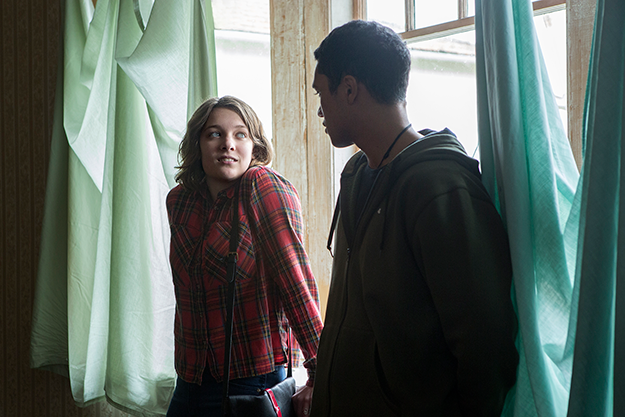
From the start of the film, you paint such a compelling and unsettling parallel between the exploitation of minors and the training of young actors. But what continually struck me while watching it was that because we’re so connected to the point of view of the young actors, they’re never presented as victims. We’re never put in a position where we think that they’re just being manipulated without any agency of their own. In fact, the question of consent and agency is really fraught.
Alison Maclean: That theme is really strong in the book, with the parallel stories, the one about the drama school. We conflated two of the teachers into one character. It was originally a male acting teacher. In the book that character was definitely predatory, so we kept that in the film, but then we made her a woman, and she’s got more shades to her, contradictions to her, and a more human side, a more vulnerable side. That’s partly a function of combining the two characters. The film is a little bit more about exploitation than the book.
Kerry Fox: What comes to mind when we’re thinking about that is cruelty and what that means, in terms of people’s control over others. So much of human interaction is control and the hierarchal situation, whether in an affair or a teaching situation. How much are people prepared to be treated bad, how much are people prepared to be cruel? It’s a very strong aspect of human nature.
AM: Or just relinquishing their power because they need something.
KF: The big question too is an unequal relationship in terms of age. I’m concerned at the moment about young girls, I’ve been doing a lot of reading about young girls and what they are experiencing because of social media in terms of their sexual experiences. I find it really distressing. I think that’s a focus for me. What they’re willing to do, how they’re treated cruelly, how they expect to be treated cruelly, and where that line is. And then I think about my own past. Because obviously this particular script and story brought up my own history. My own sexual history and stuff like that. It felt like it was always consensual, but I have a feeling it’s a very relevant issue, the expectation and consent. It’s really rich.
Was that something you were conscious of in the filmmaking process or in the process of creating a character, trying not to replicate the ethical failures of the character Hannah’s approach?
AM: Definitely. We had a quite intensive two-week rehearsal process with the two leads, and then with a group of 15, the drama school kids, a mini-boot camp over a week. That was very much about creating a sense of intimacy and trust, a safe group so that people from that base were willing to be quite open and expose themselves more personally and so that each of those kids could bring themselves in different degrees to their characters. I think it was a very respectful process. Kerry got very involved in that. When they came, they had such a range of different experiences: some of them had been in drama school, some of them had only been in films, like James Rolleston, the lead, and never done any kind of acting training. He was also hugely out of his depth, because he comes from a small town, not used to being around those kinds of kids.
KF: We were doing some exercises once, with one of the boys who wasn’t an actor, and I was leading and he felt it was too hard for him, too confronting. But what made me feel really good was that in the feedback he was able to say that it was too much. He was able to voice what had happened and why it was so terrifying. And that means it’s okay, because he wasn’t embarrassed to say. Then I felt it was fine.
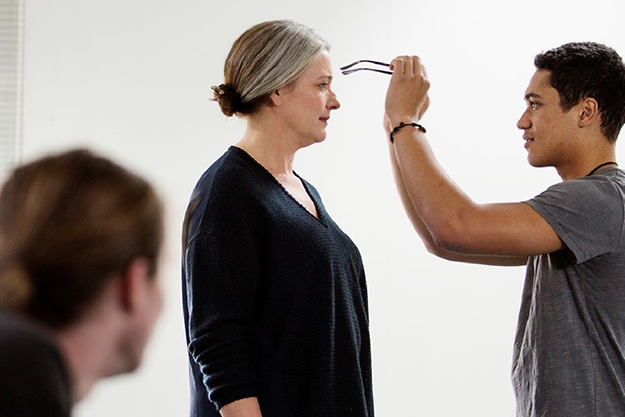
I think anyone who’s gone to drama school, myself included, can recognize that dynamic with a very charismatic acting teacher who demands this kind of self-exposure that is beyond what a young person might be ready for. But at the same time, acting is self-exposure. You have to be open and vulnerable to your emotions. Were there ever any moments where you, Kerry, felt like in getting into your character you were in danger of asking too much from the other actors?
KF: Definitely. But the way that character works is not something I approve of. I’m very against that. I have vehemently stood up against people who were like that. I will not stand having any person exploit vulnerability in others. I made sure everyone knew that I was not this character.
So you disapprove of that tradition…
KF: I don’t know if it’s a tradition, I think it’s a ’90s thing.
AM: Maybe, but I’m sure it still exists, in certain schools.
The acting in the film feels so fresh and open and exciting. Could you talk more generally about how you worked with the actors?
AM: It was such a treat for me to audition people. We cast quite a wide net, working with these two women in Wellington. We looked at a large number of kids, and they were all new to me. For one of the first stages of that, we asked them to tell a story, any kind of story, from their life that was intense in some way, or memorable or embarrassing or something. That was before they read the script, and so it was a wonderful insight into who they were as people. And then once we cast them, we had this week where we just did games and trust exercises, movement and voice, all the things you do at drama school, and telling your most intimate story, which we all did as well. Emily my co-writer and I both told our most intimate stories.
And I’d never tried to do something like this before, but there was a day where we divided them into pairs, working on scenes from Betrayal, and then Kerry came in, in character. That was the first time I met the character and they’d met the character, and she just walked the room and worked with the pairs, sometimes quite quietly. I had a strong feeling that Hannah had come into the room. And that was exciting. I did more improv that I’d ever done before. There was a scene early in the film, the “I want you” scene, with a simple script and repetition, and Kerry used the bare bones of the script and then was coming up with stuff and throwing things at James, which was perfect because all he could do was respond truthfully.
When you decided to participate in the intimate story exercise, was that an active choice to break down leadership hierarchies?
AM: Yeah. Emily and I both talked about that: that if we’re going to ask them to do it, we should do it too.
KF: Did you choose stories from when you were their age, the age of the students?
AM: I can’t even remember. I find that kind of thing so excruciating. Part of what drew me to this whole subject matter, and why I’m so fascinating by performance, is that it’s not something that’s comfortable for me in any way. Even now, just speaking in front of an audience is uncomfortable. So I guess you push yourself towards areas of your life that are particularly challenging.
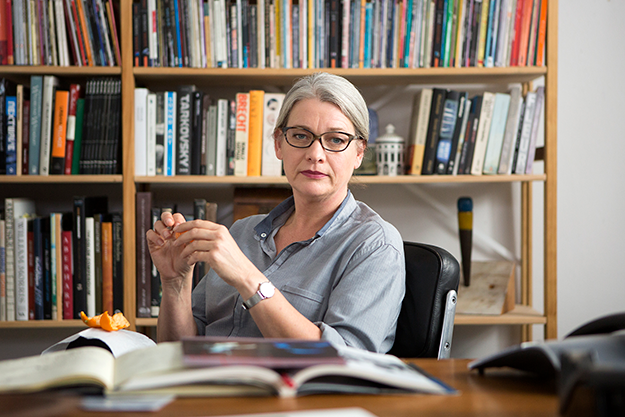
The intimate moment where we watch William perform in front of his class and teacher is such a beautifully performed scene. Your decision to turn the camera back on the students who are watching William is really striking. We watch them responding empathetically to him, in contrast to Hannah. Can you talk about your decision to film that scene the way you did?
AM: One thing we talked about [with Kerry] was the way he was talking about his mother—
KF: That really pissed me off. [Laughs]
AM: But we shot it very simply.
KF: But also the whole idea, so much of it, was about watching.
AM: Yes, very much. I was always just as much interested in the people watching what was happening.
KF: And there was a big buildup around that, there were a number of performances all building toward that. There were a number of the students’ intimate moment scenes that were not necessarily in [the final cut] that were amazing. All that atmosphere really was there. Real focus, real concentration. People doing fantastic work.
AM: There were so many characters, so many [directions] the story could go in at all times. There was one girl who just eats pizza and cries. That’s basically what she does. She didn’t say a word. It was really strong. But you can’t put it all in. We cut it in ultimately quite a lean way.
Can you talk more about watching the watchers and where that shows up in the film?
AM: I like watching people. I think it’s an activity like any other activity. If you’re watching a group of people, they have their own reactions to what’s going on. And I knew that was going to be a very important to the ending.
KF: I really like that scene of Stanley on the street, doing Joe Pitt [from Angels in America]. And then see the potential pick-up, and then we see his teacher walk by. It’s sort of a muddle of that. The excruciatingness of it all. The watching of the watching and the fake-presentation. Even when I talk about it, it makes me feel a bit sicky. The hairs on the back of my shoulders rise. It’s sort of revolting and wanky-actory.
AM: What’s the wanky-actory part?
KF: Just that, that stupid fucking exercise!
AM: I just think it’s hilarious, you know, to do that seminal work, Angels in America, and someone of Isolde’s age never heard of it. And that’s true. James [Rolleston] had never heard of it.
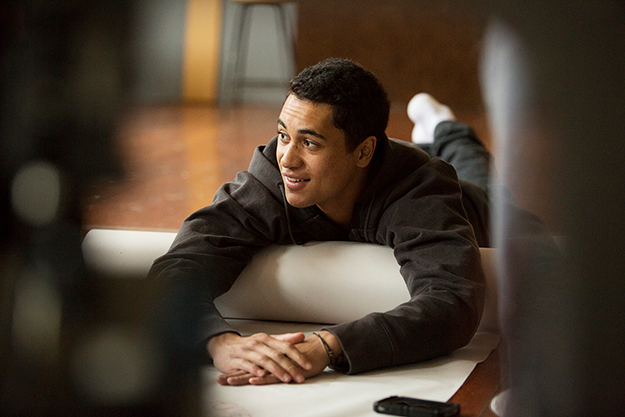
Maybe some of the hairs on the back of your neck—at least for me when I watch it, some of that comes from feeling like there’s this intimacy or connection between the erotic and the performed erotic. The real erotic can shade into the performed erotic and the performed erotic can shade into the real erotic and you’ve got this kid stuck in the middle who doesn’t seem to know where to look. Or how to do either one. I love that about the film in general. There are these very tender and awkward scenes of sexual exploration between young people that you just let go on a little too long.
KF: Yes, the scene where William kisses her, I love that! He’s so cool and then he’s such a plonker. It’s excruciating. It’s so lovely.
It is so vulnerable, an honest, vulnerable moment of—
KF: —being completely and totally useless! [Laughs]
Without giving too much away about the ending, it did strike me that we end with what feels like a moment of resistance—
AM: —yes, to the evening and the structure.
And to the strictures of authority.
AM: Yeah, yeah.
But they also stop acting.
AM: Yeah, totally.
I wondered if there was a question or a statement there about what it would mean to resist authority for these kids. It might actually mean resisting—
AM: Not acting.
—being available for the gaze of the audience.
AM: And resisting performing, in a way. You know, the ending was the biggest challenge. In a way, the problem the actors have is the same problem that we had, which is that the whole film is following a particular set of ideas and a kind of plan that gets abandoned. And at the last minute. And so, then what? It was quite scary to come up with something, but we just knew that it couldn’t be some virtuoso acting thing. It couldn’t be that.
Why couldn’t it be that?
AM: Because it just felt inherently bogus. Also we did want it to contain a sense of resistance. It took a long time to arrive at that. I felt that I wanted it to be something that brought you out of the film and brought you into the experience of watching the film. And also that was more a present-tense experience—an experiential thing, not a performative thing.
It made me think about whether there was also a resistance to my gaze as a spectator of the film. I was thinking about the gaze of the older person on these younger people, which at various points in the film feels quite exploitative, and the gaze of the film audience on these young actors and their awkward bodies and their beauty and their rawness. I wondered if you were playing with that idea.
AM: I love that kind of thing. I like a film or an artwork that somehow acknowledges the process of making it. And even the way it might be received. We didn’t want to hit that too hard, but I enjoy that. I did a short film a few years ago called Intolerable about auditions that was partly inspired by a film by [Mohsen] Makhmalbaf called Salaam Cinema. The film is made up of open auditions for his next film, and then the auditions became the film. I was knocked out by that film. It’s been a train of ideas for a while.
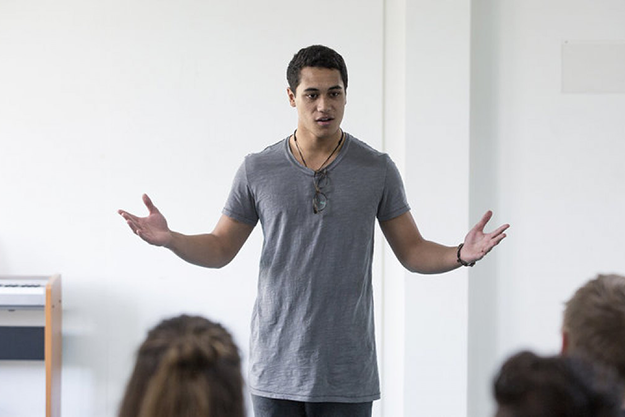
Going back to this question of point of view, you have these wonderful scenes where we only see the kids in the frame and then suddenly the parent reaches in—
AM: We [I and the cinematographer, Andrew Commis] talked about that quite a bit. We talked about not panning when someone walks in a room, not doing coverage in that sense. And also something I get a bit obsessed with is the frame, and the tension in the frame, between off-screen space and what’s happening on screen, and imagining what’s off screen and what you can’t see. I find that very powerful. So we talked about that a lot, and then it became stronger in the edit.
It’s a combination of your plan and then the accidents of what happens on set. I talked about the “I want you” scene before and it [also] just sort of happened that way: we had certain shots and we’d be looking at the kids watching and then Hannah would just march into the frame and then she’d march out again and then it suddenly seemed way more interesting to hear her out of frame and not follow her and not cover all of that. And then she suddenly appears—it’s unpredictable, I was very excited by that. It gave it a great unexpected, disruptive energy. Even funny little things like when Stanley decides to crawl. We were shooting it and Andy decided not to tilt down and then he’s just crawling under the frame and I just loved it. That’s like my sense of humor. It’s just perfect that he’s under the frame and you’re imagining him down there.
What was it like to film in New Zealand?
AM: It was wonderful because I haven’t worked there for so long. So it was like starting again in a way. It was lovely to reconnect to the place, but also I felt that having been away for so long I could see the place fresh in a way that’s hard to do when you live there. It’s both deeply familiar but also deeply changed. New Zealand is an utterly different place. When I went to art school there in the ’80s, it was so homogeneous and so white. And it’s just not anymore. It’s now very diverse, it’s just a completely different place.
KF: It’s changed culturally a lot. Even the way people speak.
Did you feel that generational difference with the young actors?
KF: They felt much more worldly than I did at their age. Not necessarily more well read, but a better concept of what was out there. And possibly more ambitious. And more articulate, I think.
Have you ever had any experiences, Kerry, of where you were working on a character, and you felt like you were getting too close to the real, like Stanley does in the film? Is that a familiar feeling?
KF: A friend of mine wrote a book once, and it was my story. I suppose that’s a terrible thing about writers, they nick your stories.
It’s always the danger with any kind of art-making, isn’t it, where you go close to the real, but then there has to be some sort of boundary. But that line shifts depending on which side of it you’re on.
AM: Definitely. It comes up all the time as a writer. You always want to use people’s stories. Often I’ll just ask. I’ve certainly done that. And sometimes I think, oh I can’t go there. But you always want to. Because often they’re better than the stories you can make up yourself.
Shonni Enelow is the author of Method Acting and Its Discontents: On American Psycho-drama (Northwestern University Press). She is an assistant professor of English at Fordham University.







